
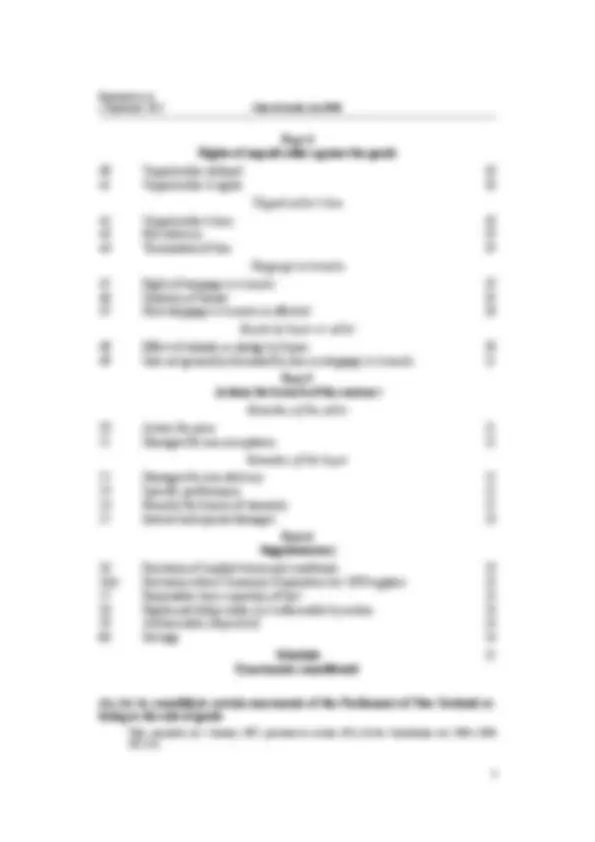
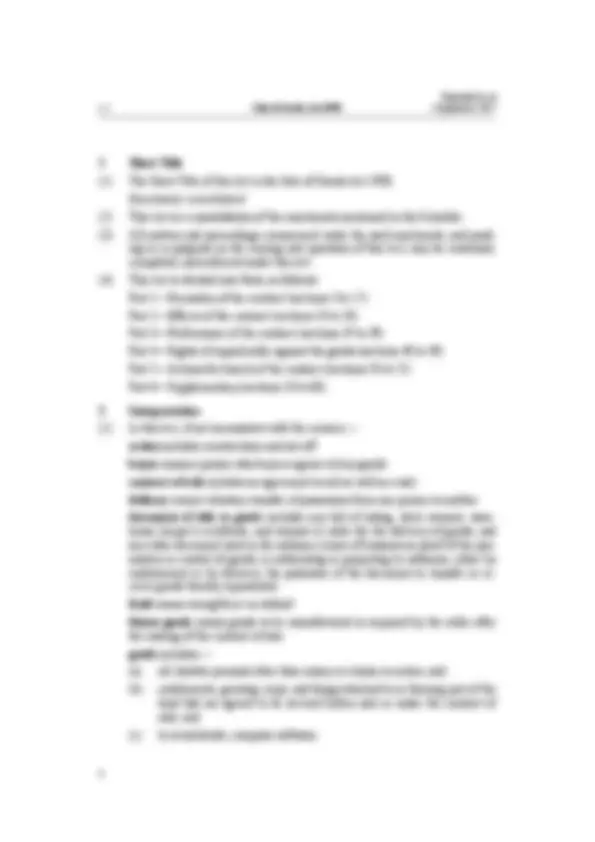
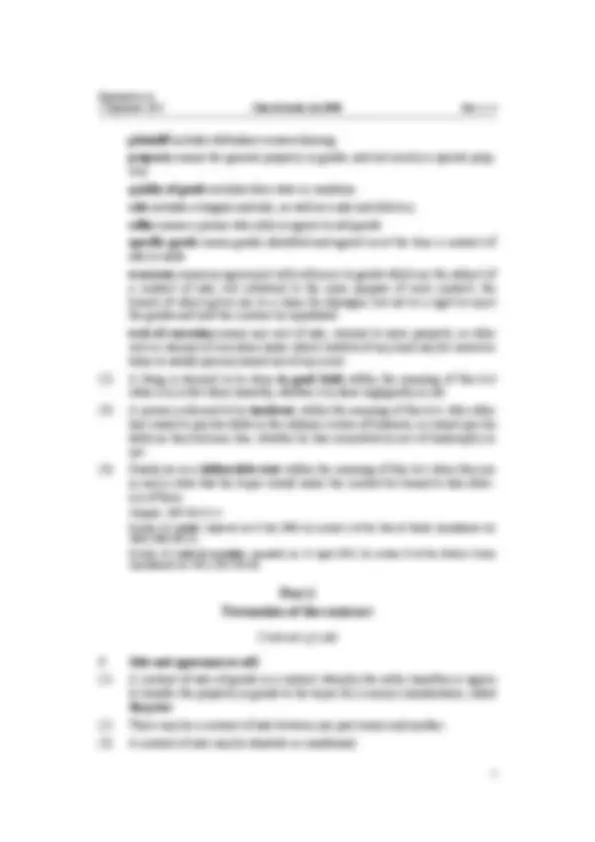
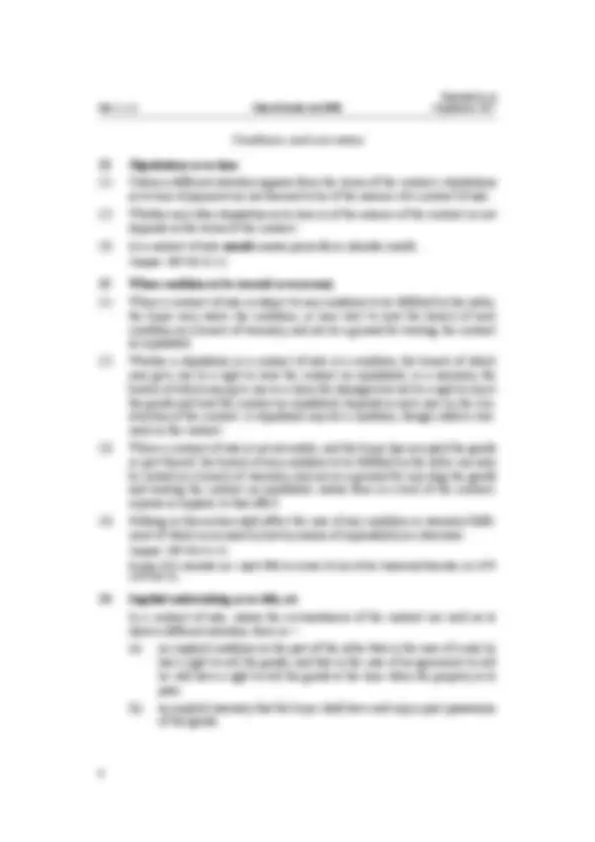
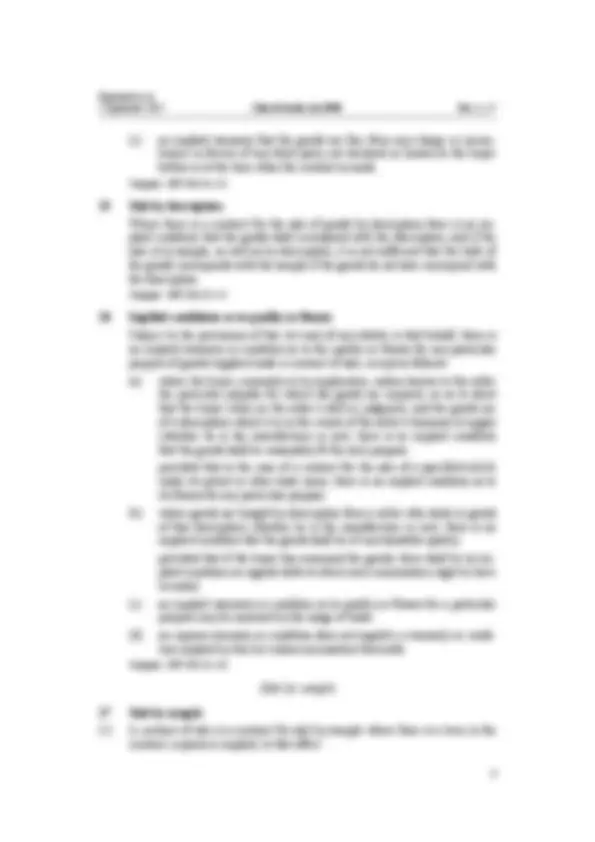
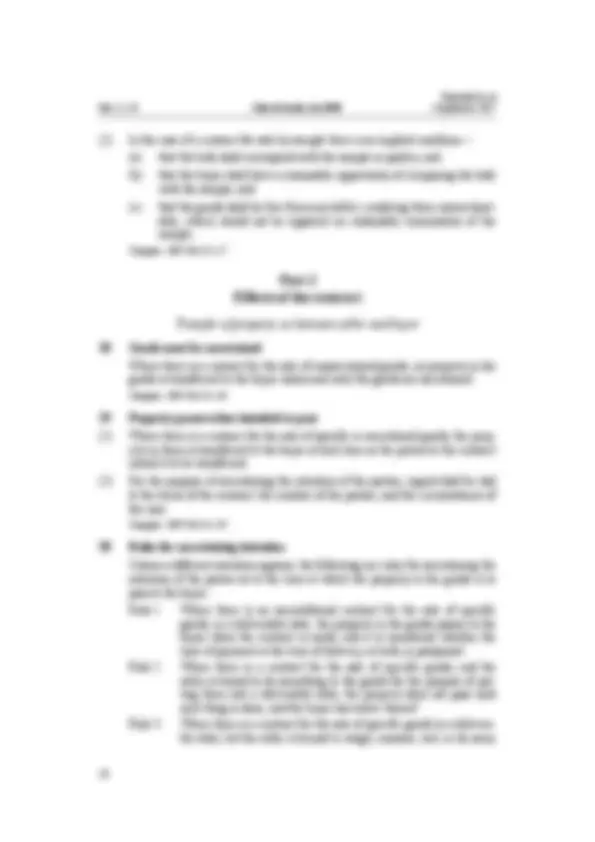
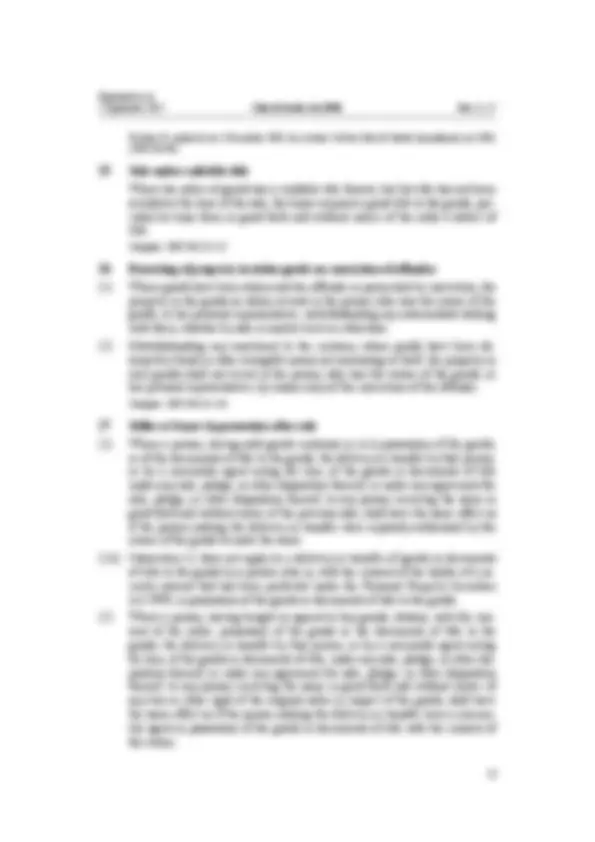
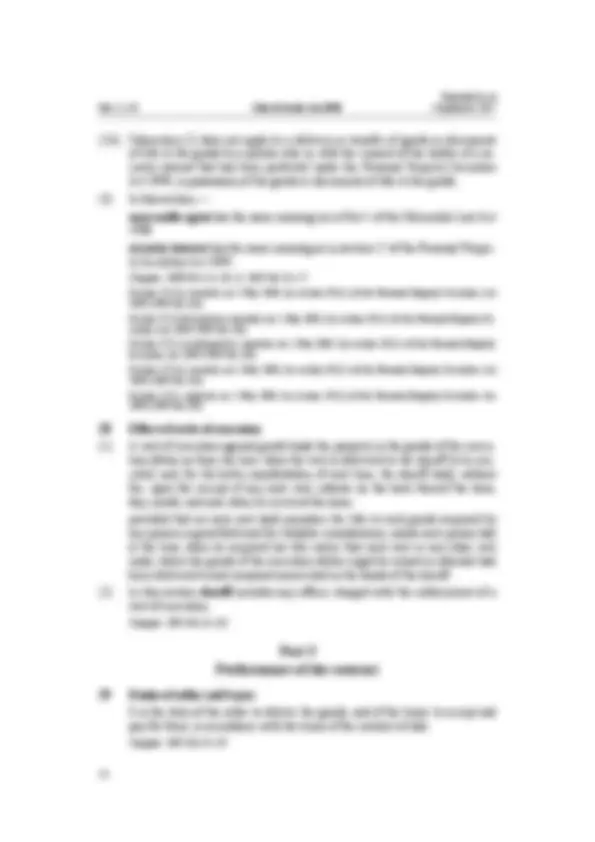
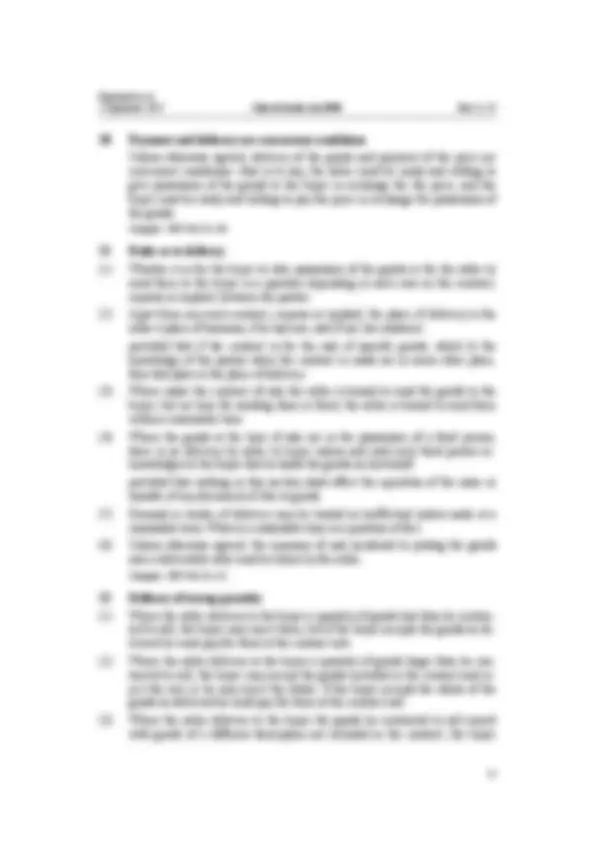
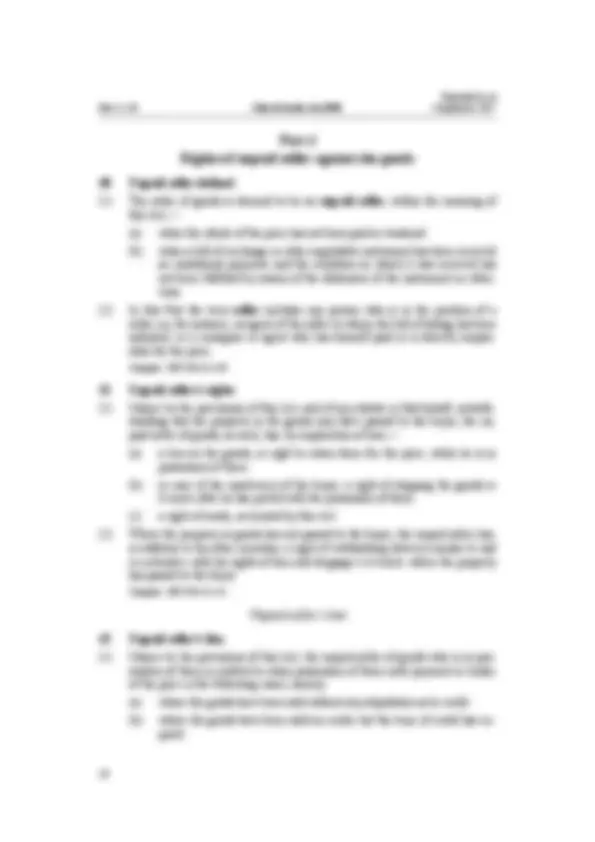
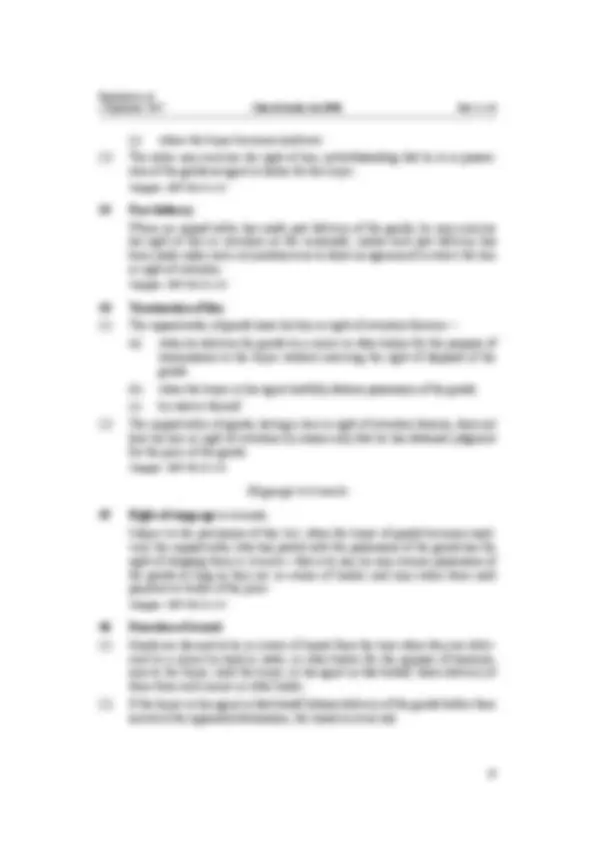
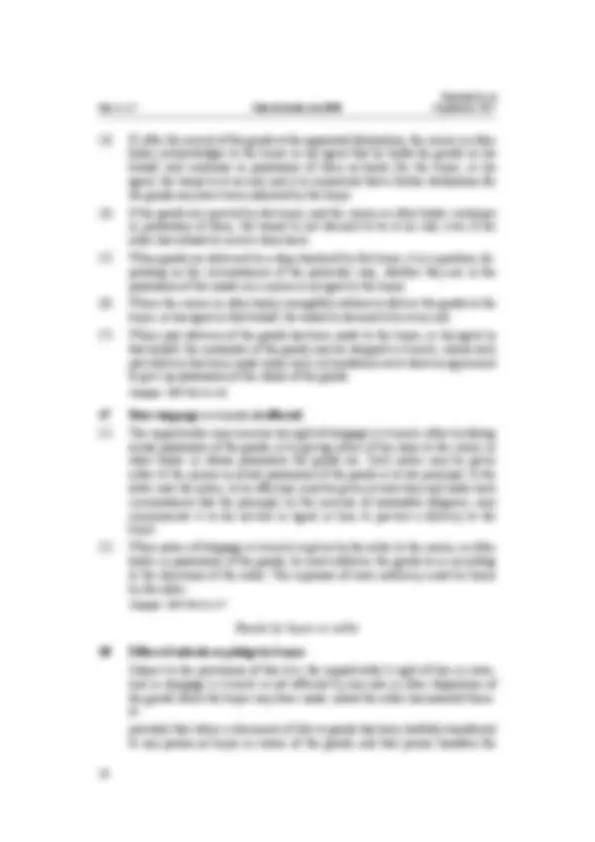
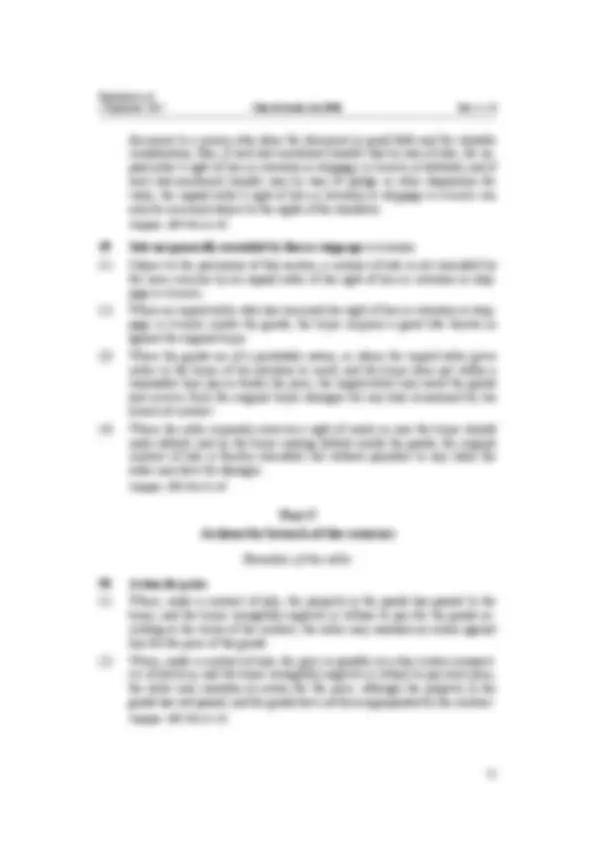
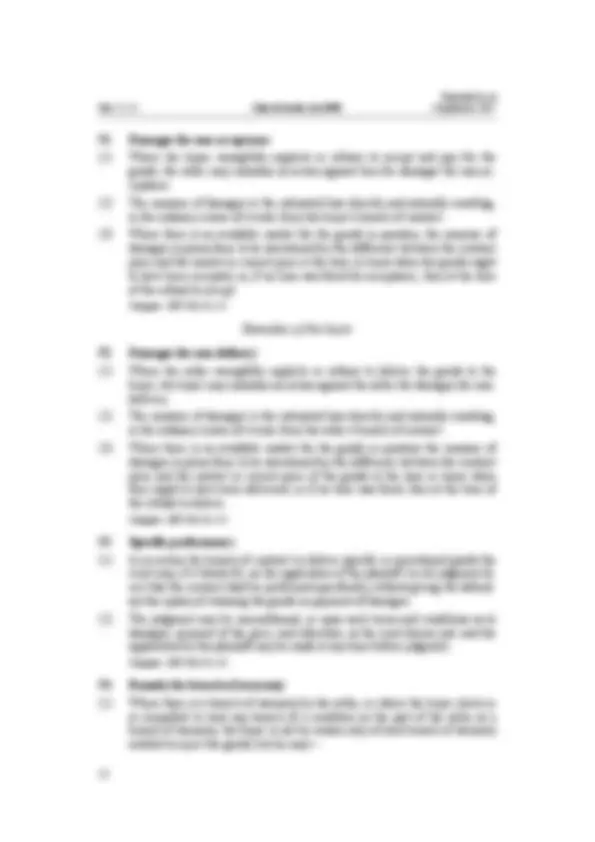
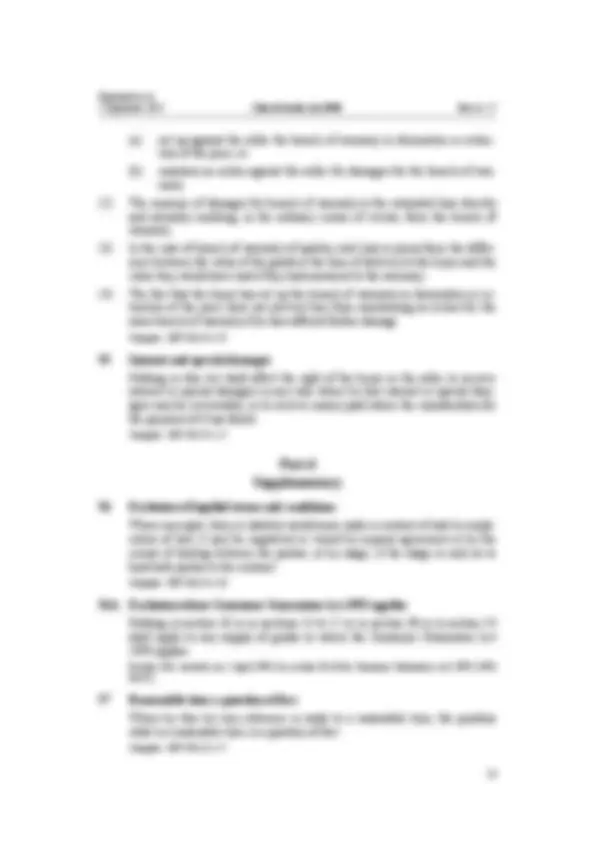
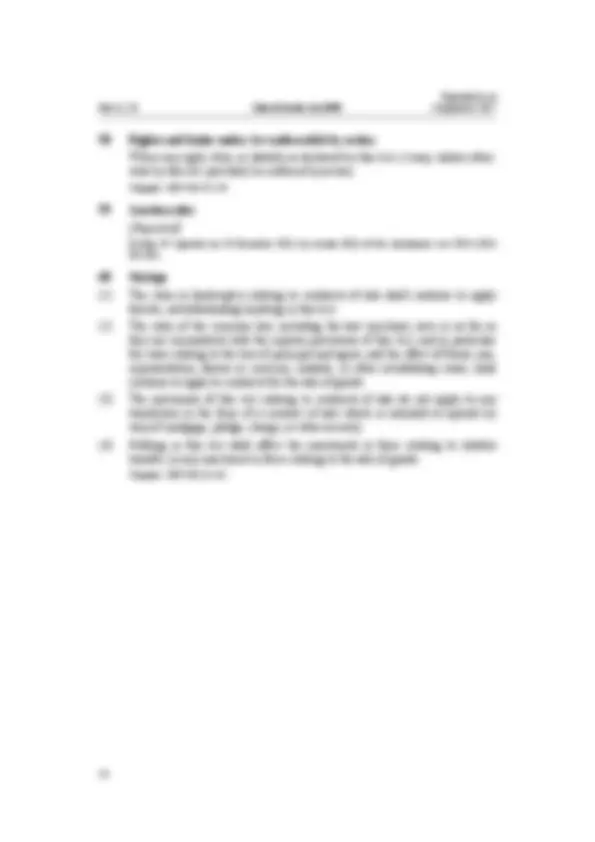

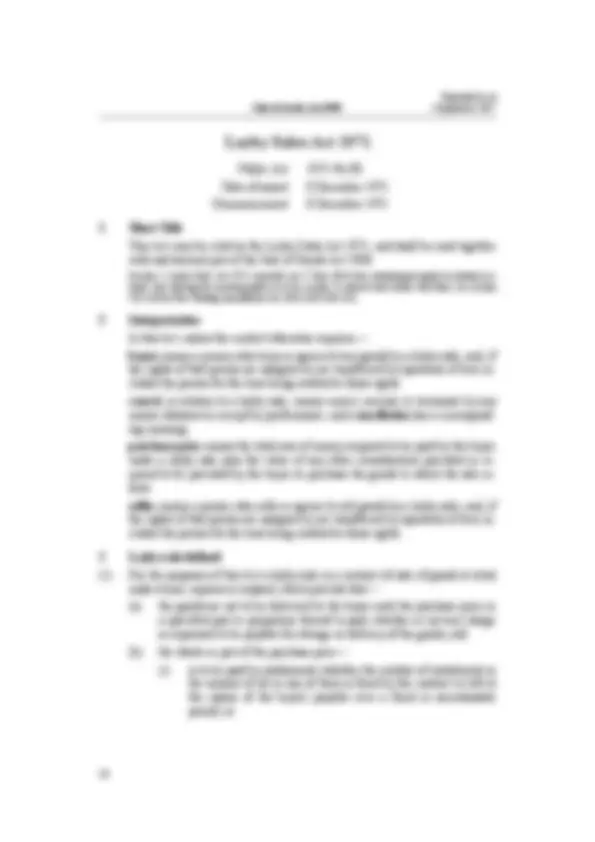
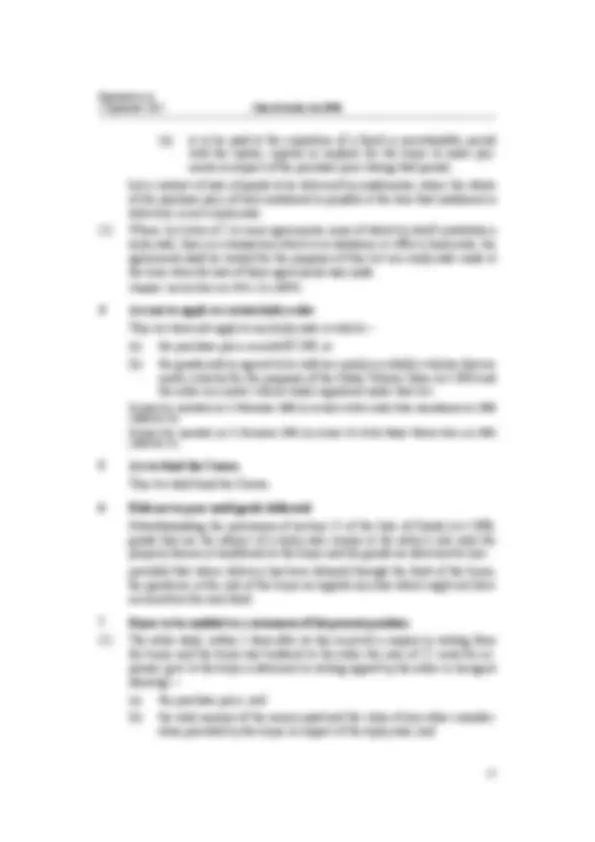
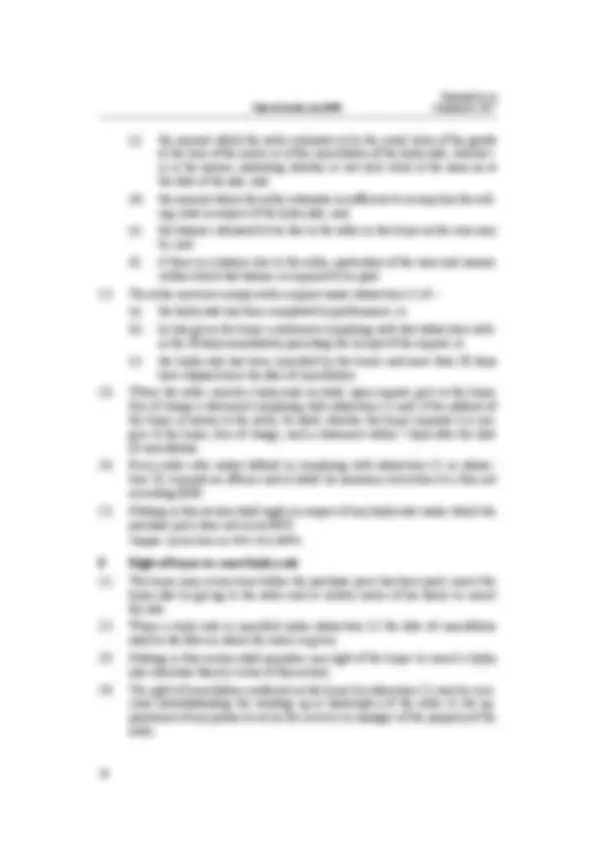
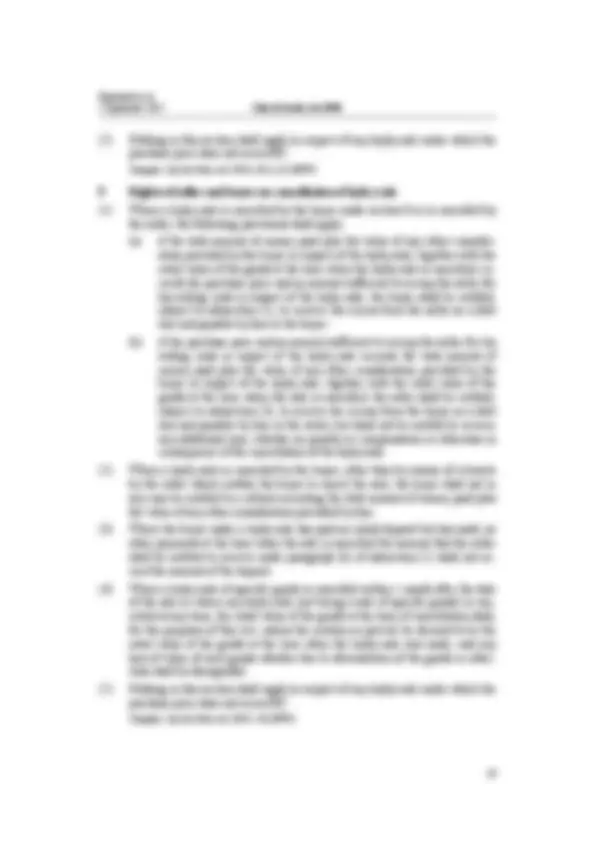
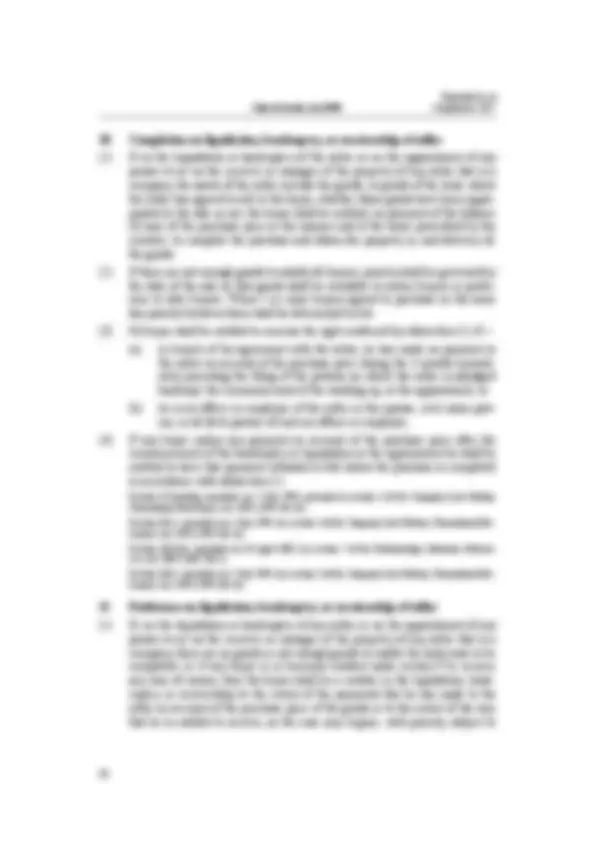
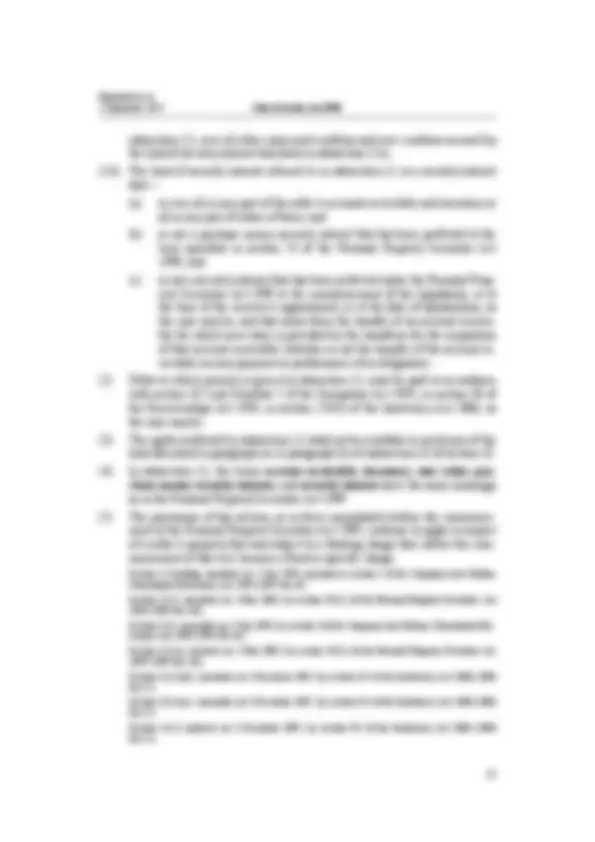
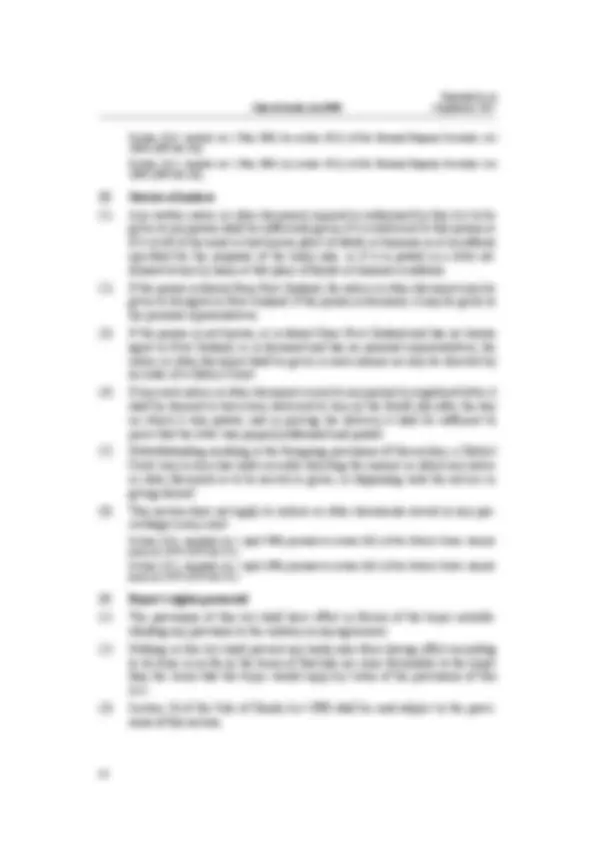

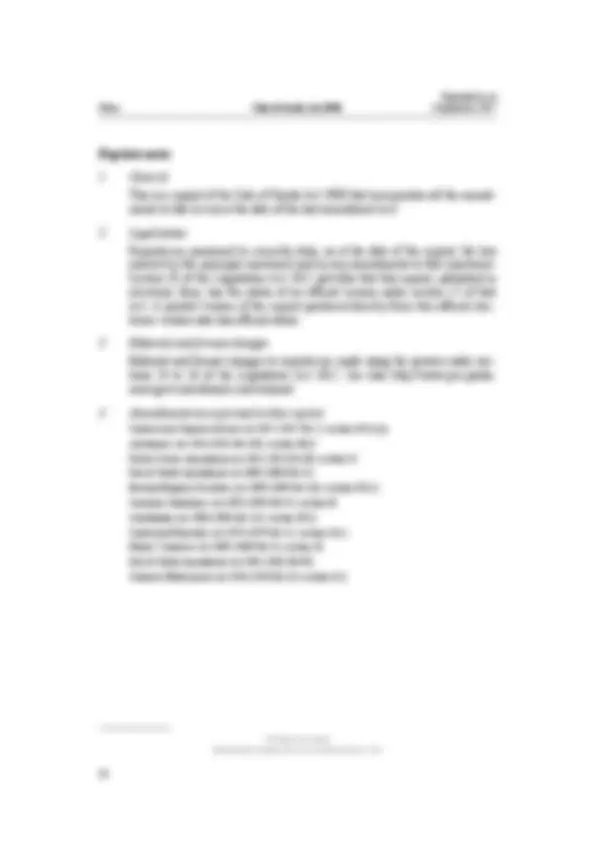


Study with the several resources on Docsity

Earn points by helping other students or get them with a premium plan


Prepare for your exams
Study with the several resources on Docsity

Earn points to download
Earn points by helping other students or get them with a premium plan
Community
Ask the community for help and clear up your study doubts
Discover the best universities in your country according to Docsity users
Free resources
Download our free guides on studying techniques, anxiety management strategies, and thesis advice from Docsity tutors
A part of the Sale of Goods Act 1908, which outlines the rules and regulations for the sale of goods in New Zealand. It covers various aspects of the contract of sale, including the transfer of property, performance of the contract, and the rights of unpaid sellers. Topics include the passing of property, risk, delivery, buyer's rights, and actions for breach of the contract.
Typology: Study notes
1 / 34

This page cannot be seen from the preview
Don't miss anything!



























Public Act 1908 No 168 Date of assent 4 August 1908 Commencement 4 August 1908 Sale of Goods Act 1908: repealed, on 1 September 2017, by section 345(1)(i) of the Contract and Commercial Law Act 2017 (2017 No 5).
Contents Page Title 3
1 Short Title 4 2 Interpretation 4
Part 1 Formation of the contract Contract of sale
3 Sale and agreement to sell 5 4 Capacity to buy and sell 6
Formalities of the contract
5 Contract of sale, how made 6 6 Contract of sale for £10 and upwards [Repealed] 6
Subject matter of contract
7 Existing or future goods 6 8 Goods which have perished 7
Note Changes authorised by subpart 2 of Part 2 of the Legislation Act 2012 have been made in this official reprint. Note 4 at the end of this reprint provides a list of the amendments incorporated. This Act is administered by the Ministry of Business, Innovation, and Employment.
Reprint as at 1 September 2017
Effects of the contract
1 Short Title
(1) The Short Title of this Act is the Sale of Goods Act 1908.
Enactments consolidated
(2) This Act is a consolidation of the enactments mentioned in the Schedule.
(3) All matters and proceedings commenced under the said enactments, and pend- ing or in progress on the coming into operation of this Act, may be continued, completed, and enforced under this Act.
(4) This Act is divided into Parts, as follows:
Part 1—Formation of the contract (sections 3 to 17) Part 2—Effects of the contract (sections 18 to 28) Part 3—Performance of the contract (sections 29 to 39) Part 4—Rights of unpaid seller against the goods (sections 40 to 49) Part 5—Actions for breach of the contract (sections 50 to 55) Part 6—Supplementary (sections 56 to 60).
2 Interpretation
(1) In this Act, if not inconsistent with the context,—
action includes counterclaim and set-off buyer means a person who buys or agrees to buy goods contract of sale includes an agreement to sell as well as a sale delivery means voluntary transfer of possession from one person to another document of title to goods includes any bill of lading, dock warrant, ware- house keeper’s certificate, and warrant or order for the delivery of goods, and any other document used in the ordinary course of business as proof of the pos- session or control of goods, or authorising or purporting to authorise, either by endorsement or by delivery, the possessor of the document to transfer or re- ceive goods thereby represented fault means wrongful act or default future goods means goods to be manufactured or acquired by the seller after the making of the contract of sale goods includes— (a) all chattels personal other than money or choses in action; and (b) emblements, growing crops, and things attached to or forming part of the land that are agreed to be severed before sale or under the contract of sale; and (c) to avoid doubt, computer software
s 1 Sale of Goods Act 1908 1 September 2017
plaintiff includes defendant counterclaiming property means the general property in goods, and not merely a special prop- erty quality of goods includes their state or condition sale includes a bargain and sale, as well as a sale and delivery seller means a person who sells or agrees to sell goods specific goods means goods identified and agreed on at the time a contract of sale is made warranty means an agreement with reference to goods which are the subject of a contract of sale, but collateral to the main purpose of such contract, the breach of which gives rise to a claim for damages, but not to a right to reject the goods and treat the contract as repudiated writ of execution means any writ of sale, warrant to seize property, or other writ or warrant of execution under which chattels of any kind may be seized or taken to satisfy process issued out of any court.
(2) A thing is deemed to be done in good faith within the meaning of this Act when it is in fact done honestly, whether it is done negligently or not.
(3) A person is deemed to be insolvent , within the meaning of this Act, who either has ceased to pay his debts in the ordinary course of business, or cannot pay his debts as they become due, whether he has committed an act of bankruptcy or not.
(4) Goods are in a deliverable state within the meaning of this Act when they are in such a state that the buyer would under the contract be bound to take deliv- ery of them. Compare: 1895 No 23 s 2 Section 2(1) goods : replaced, on 8 July 2003, by section 3 of the Sale of Goods Amendment Act 2003 (2003 No 35). Section 2(1) writ of execution : amended, on 14 April 2014, by section 43 of the District Courts Amendment Act 2011 (2011 No 30).
3 Sale and agreement to sell
(1) A contract of sale of goods is a contract whereby the seller transfers or agrees to transfer the property in goods to the buyer for a money consideration, called the price.
(2) There may be a contract of sale between one part owner and another.
(3) A contract of sale may be absolute or conditional.
1 September 2017 Sale of Goods Act 1908 Part 1 s 3
quired by the seller after the making of the contract of sale, in this Act called future goods.
(2) There may be a contract for the sale of goods, the acquisition of which by the seller depends upon a contingency which may or may not happen.
(3) Where by a contract of sale the seller purports to effect a present sale of future goods, the contract operates as an agreement to sell the goods. Compare: 1895 No 23 s 7
8 Goods which have perished
Where there is a contract for the sale of specific goods, and the goods without the knowledge of the seller have perished at the time when the contract is made, the contract is void. Compare: 1895 No 23 s 8
9 Goods perishing before sale but after agreement to sell
Where there is an agreement to sell specific goods, and subsequently the goods, without any fault on the part of the seller or buyer, perish before the risk passes to the buyer, the agreement is thereby avoided. Compare: 1895 No 23 s 9
10 Ascertainment of price
(1) The price in a contract of sale may be fixed by the contract, or may be left to be fixed in manner thereby agreed, or may be determined by the course of dealing between the parties.
(2) Where the price is not determined in accordance with the foregoing provisions the buyer must pay a reasonable price.
(3) What is a reasonable price is a question of fact, dependent on the circumstances of each particular case. Compare: 1895 No 23 s 10
11 Agreement to sell at valuation
(1) Where there is an agreement to sell goods on the terms that the price is to be fixed by the valuation of a third party, and such third party cannot or does not make such valuation, the agreement is avoided: provided that if the goods or any part thereof have been delivered to and appro- priated by the buyer he must pay a reasonable price therefor.
(2) Where such third party is prevented from making the valuation by the fault of the seller or buyer, the party not in fault may maintain an action for damages against the party in fault. Compare: 1895 No 23 s 11
1 September 2017 Sale of Goods Act 1908 Part 1 s 11
12 Stipulations as to time
(1) Unless a different intention appears from the terms of the contract, stipulations as to time of payment are not deemed to be of the essence of a contract of sale.
(2) Whether any other stipulation as to time is of the essence of the contract or not depends on the terms of the contract.
(3) In a contract of sale month means prima facie calendar month. Compare: 1895 No 23 s 12
13 When condition to be treated as warranty
(1) Where a contract of sale is subject to any condition to be fulfilled by the seller, the buyer may waive the condition, or may elect to treat the breach of such condition as a breach of warranty, and not as a ground for treating the contract as repudiated.
(2) Whether a stipulation in a contract of sale is a condition, the breach of which may give rise to a right to treat the contract as repudiated, or a warranty, the breach of which may give rise to a claim for damages but not to a right to reject the goods and treat the contract as repudiated, depends in each case on the con- struction of the contract. A stipulation may be a condition, though called a war- ranty in the contract.
(3) Where a contract of sale is not severable, and the buyer has accepted the goods or part thereof, the breach of any condition to be fulfilled by the seller can only be treated as a breach of warranty, and not as a ground for rejecting the goods and treating the contract as repudiated, unless there is a term of the contract, express or implied, to that effect.
(4) Nothing in this section shall affect the case of any condition or warranty fulfil- ment of which is excused by law by reason of impossibility or otherwise. Compare: 1895 No 23 s 13 Section 13(3): amended, on 1 April 1980, by section 14(1)(a) of the Contractual Remedies Act 1979 (1979 No 11).
14 Implied undertaking as to title, etc
In a contract of sale, unless the circumstances of the contract are such as to show a different intention, there is— (a) an implied condition on the part of the seller that in the case of a sale he has a right to sell the goods, and that in the case of an agreement to sell he will have a right to sell the goods at the time when the property is to pass: (b) an implied warranty that the buyer shall have and enjoy quiet possession of the goods:
Part 1 s 12 Sale of Goods Act 1908 1 September 2017
(2) In the case of a contract for sale by sample there is an implied condition—
(a) that the bulk shall correspond with the sample in quality; and (b) that the buyer shall have a reasonable opportunity of comparing the bulk with the sample; and (c) that the goods shall be free from any defect, rendering them unmerchant- able, which would not be apparent on reasonable examination of the sample. Compare: 1895 No 23 s 17
18 Goods must be ascertained
Where there is a contract for the sale of unascertained goods, no property in the goods is transferred to the buyer unless and until the goods are ascertained. Compare: 1895 No 23 s 18
19 Property passes when intended to pass
(1) Where there is a contract for the sale of specific or ascertained goods, the prop- erty in them is transferred to the buyer at such time as the parties to the contract intend it to be transferred.
(2) For the purpose of ascertaining the intention of the parties, regard shall be had to the terms of the contract, the conduct of the parties, and the circumstances of the case. Compare: 1895 No 23 s 19
20 Rules for ascertaining intention
Unless a different intention appears, the following are rules for ascertaining the intention of the parties as to the time at which the property in the goods is to pass to the buyer: Rule 1 Where there is an unconditional contract for the sale of specific goods, in a deliverable state, the property in the goods passes to the buyer when the contract is made, and it is immaterial whether the time of payment or the time of delivery, or both, is postponed. Rule 2 Where there is a contract for the sale of specific goods, and the seller is bound to do something to the goods for the purpose of put- ting them into a deliverable state, the property does not pass until such thing is done, and the buyer has notice thereof. Rule 3 Where there is a contract for the sale of specific goods in a delivera- ble state, but the seller is bound to weigh, measure, test, or do some
Part 2 s 18 Sale of Goods Act 1908 1 September 2017
other act or thing with reference to the goods for the purpose of as- certaining the price, the property does not pass until such act or thing is done, and the buyer has notice thereof. Rule 4 Where goods are delivered to the buyer on approval, or on sale or return or other similar terms, the property therein passes to the buyer— (a) when he signifies his approval or acceptance to the seller, or does any other act adopting the transaction: (b) if he does not signify his approval or acceptance to the seller, but retains the goods without giving notice of rejection then, if a time has been fixed for the return of the goods, on the ex- piration of such time, and if no time has been fixed, on the expiration of a reasonable time. What is a reasonable time is a question of fact. Rule 5 (1) Where there is a contract for the sale of unascertained or future goods by description, and goods of that description and in a deliverable state are unconditionally appropriated to the contract, either by the seller with the assent of the buyer or by the buyer with the assent of the seller, the property in the goods thereupon passes to the buyer. Such assent may be expressed or implied, and may be given either before or after the appropriation is made. (2) Where, in pursuance of the contract, the seller delivers the goods to the buyer, or to a carrier or other bailee (whether named by the buyer or not) for the purpose of transmission to the buyer, and does not reserve the right of disposal, he is deemed to have unconditionally appropriated the goods to the contract. Compare: 1895 No 23 s 20
21 Reservation of right of disposal
(1) Where there is a contract for the sale of specific goods, or where goods are sub- sequently appropriated to the contract, the seller may, by the terms of the con- tract or appropriation, reserve the right of disposal of the goods until certain conditions are fulfilled.
(2) In such case, notwithstanding the delivery of the goods to the buyer, or to a car- rier or other bailee for the purpose of transmission to the buyer, the property in the goods does not pass to the buyer until the conditions imposed by the seller are fulfilled.
(3) Where goods are shipped, and by the bill of lading the goods are deliverable to the order of the seller or his agent, the seller is prima facie deemed to reserve the right of disposal.
1 September 2017 Sale of Goods Act 1908 Part 2 s 21
Section 24: replaced, on 1 December 1961, by section 2 of the Sale of Goods Amendment Act 1961 (1961 No 98).
25 Sale under voidable title
Where the seller of goods has a voidable title thereto, but his title has not been avoided at the time of the sale, the buyer acquires a good title to the goods, pro- vided he buys them in good faith and without notice of the seller’s defect of title. Compare: 1895 No 23 s 25
26 Revesting of property in stolen goods on conviction of offender
(1) Where goods have been stolen and the offender is prosecuted to conviction, the property in the goods so stolen revests in the person who was the owner of the goods, or his personal representative, notwithstanding any intermediate dealing with them, whether by sale in market overt or otherwise.
(2) Notwithstanding any enactment to the contrary, where goods have been ob- tained by fraud or other wrongful means not amounting to theft, the property in such goods shall not revest in the person who was the owner of the goods, or his personal representative, by reason only of the conviction of the offender. Compare: 1895 No 23 s 26
27 Seller or buyer in possession after sale
(1) Where a person, having sold goods continues or is in possession of the goods, or of the documents of title to the goods, the delivery or transfer by that person, or by a mercantile agent acting for him, of the goods or documents of title under any sale, pledge, or other disposition thereof, or under any agreement for sale, pledge, or other disposition thereof, to any person receiving the same in good faith and without notice of the previous sale, shall have the same effect as if the person making the delivery or transfer were expressly authorised by the owner of the goods to make the same.
(1A) Subsection (1) does not apply to a delivery or transfer of goods or documents of title to the goods by a person who is, with the consent of the holder of a se- curity interest that has been perfected under the Personal Property Securities Act 1999, in possession of the goods or documents of title to the goods.
(2) Where a person, having bought or agreed to buy goods, obtains, with the con- sent of the seller, possession of the goods or the documents of title to the goods, the delivery or transfer by that person, or by a mercantile agent acting for him, of the goods or documents of title, under any sale, pledge, or other dis- position thereof, or under any agreement for sale, pledge, or other disposition thereof, to any person receiving the same in good faith and without notice of any lien or other right of the original seller in respect of the goods, shall have the same effect as if the person making the delivery or transfer were a mercan- tile agent in possession of the goods or documents of title with the consent of the owner.
1 September 2017 Sale of Goods Act 1908 Part 2 s 27
(2A) Subsection (2) does not apply to a delivery or transfer of goods or documents of title to the goods by a person who is, with the consent of the holder of a se- curity interest that has been perfected under the Personal Property Securities Act 1999, in possession of the goods or documents of title to the goods.
(3) In this section,—
mercantile agent has the same meaning as in Part 1 of the Mercantile Law Act 1908 security interest has the same meaning as in section 17 of the Personal Proper- ty Securities Act 1999. Compare: 1890 No 11 ss 10, 11; 1895 No 23 s 27 Section 27(1A): inserted, on 1 May 2002, by section 191(1) of the Personal Property Securities Act 1999 (1999 No 126). Section 27(2) first proviso: repealed, on 1 May 2002, by section 191(1) of the Personal Property Se- curities Act 1999 (1999 No 126). Section 27(2) second proviso: repealed, on 1 May 2002, by section 191(1) of the Personal Property Securities Act 1999 (1999 No 126). Section 27(2A): inserted, on 1 May 2002, by section 191(1) of the Personal Property Securities Act 1999 (1999 No 126). Section 27(3): replaced, on 1 May 2002, by section 191(1) of the Personal Property Securities Act 1999 (1999 No 126).
28 Effect of writs of execution
(1) A writ of execution against goods binds the property in the goods of the execu- tion debtor as from the time when the writ is delivered to the sheriff to be exe- cuted; and, for the better manifestation of such time, the sheriff shall, without fee, upon the receipt of any such writ, indorse on the back thereof the hour, day, month, and year when he received the same: provided that no such writ shall prejudice the title to such goods acquired by any person in good faith and for valuable consideration, unless such person had at the time when he acquired his title notice that such writ or any other writ under which the goods of the execution debtor might be seized or attached had been delivered to and remained unexecuted in the hands of the sheriff.
(2) In this section sheriff includes any officer charged with the enforcement of a writ of execution. Compare: 1895 No 23 s 28
29 Duties of seller and buyer
It is the duty of the seller to deliver the goods, and of the buyer to accept and pay for them, in accordance with the terms of the contract of sale. Compare: 1895 No 23 s 29
Part 2 s 28 Sale of Goods Act 1908 1 September 2017
may accept the goods which are in accordance with the contract and reject the rest, or he may reject the whole.
(4) The provisions of this section are subject to any usage of trade, special agree- ment, or course of dealing between the parties. Compare: 1895 No 23 s 32
33 Instalment deliveries
(1) Unless otherwise agreed, the buyer of goods is not bound to accept delivery thereof by instalments.
(2) Where there is a contract for the sale of goods to be delivered by stated instal- ments, which are to be separately paid for, and the seller makes defective deliv- eries in respect of 1 or more instalments, or the buyer neglects or refuses to take delivery of or pay for 1 or more instalments, it is a question in each case depending on the terms of the contract and the circumstances of the case, whether the breach of contract is a repudiation of the whole contract or whether it is a severable breach, giving rise to a claim for compensation but not to a right to treat the whole contract as repudiated. Compare: 1895 No 23 s 33
34 Delivery to carrier
(1) Where, under a contract of sale, the seller is authorised or required to send the goods to the buyer, delivery of the goods to a carrier, whether named by the buyer or not, for the purpose of transmission to the buyer is prima facie deemed to be a delivery of the goods to the buyer.
(2) Unless otherwise authorised by the buyer, the seller must make such contract with the carrier on behalf of the buyer as may be reasonable, having regard to the nature of the goods and the other circumstances of the case. If the seller omits so to do, and the goods are lost or damaged in course of transit, the buyer may decline to treat the delivery to the carrier as a delivery to himself, or may hold the seller responsible in damages.
(3) Unless otherwise agreed, where goods are sent by the seller to the buyer by a route involving sea transit, under circumstances in which it is usual to insure, the seller must give such notice to the buyer as may enable him to insure them during their sea transit, and, if the seller fails to do so, the goods shall be deemed to be at his risk during such sea transit. Compare: 1895 No 23 s 34
35 Risk where goods are delivered at distant place
Where the seller of goods agrees to deliver them at his own risk at a place other than that where they are when sold, the buyer must, nevertheless, unless other- wise agreed, take any risk of deterioration in the goods necessarily incident to the course of transit. Compare: 1895 No 23 s 35
Part 3 s 33 Sale of Goods Act 1908 1 September 2017
36 Buyer’s right of examining the goods
(1) Where goods are delivered to the buyer, which he has not previously examined, he is not deemed to have accepted them unless and until he has had a reason- able opportunity of examining them for the purpose of ascertaining whether they are in conformity with the contract.
(2) Unless otherwise agreed, when the seller tenders delivery of goods to the buyer, he is bound, on request, to afford the buyer a reasonable opportunity of examining the goods for the purpose of ascertaining whether they are in con- formity with the contract. Compare: 1895 No 23 s 36
37 Acceptance
The buyer is deemed to have accepted the goods when he intimates to the seller that he has accepted them, or (except where section 36 otherwise provides) when the goods have been delivered to him, and he does any act in relation to them which is inconsistent with the ownership of the seller, or when after the lapse of a reasonable time he retains the goods, without intimating to the seller that he has rejected them. Compare: 1895 No 23 s 37 Section 37: amended, on 1 April 1980, by section 14(1)(b) of the Contractual Remedies Act 1979 (1979 No 11).
38 Buyer not bound to return rejected goods
Unless otherwise agreed, where goods are delivered to the buyer, and he refu- ses to accept them, having the right so to do, he is not bound to return them to the seller, but it is sufficient if he intimates to the seller that he refuses to accept them. Compare: 1895 No 23 s 38
39 Liability of buyer for neglecting or refusing delivery of goods
Where the seller is ready and willing to deliver the goods, and requests the buyer to take delivery, and the buyer does not within a reasonable time after such request take delivery of the goods, he is liable to the seller for any loss occasioned by his neglect or refusal to take delivery, and also for a reasonable charge for the care and custody of the goods: provided that nothing in this section shall affect the rights of the seller where the neglect or refusal of the buyer to take delivery amounts to a repudiation of the contract. Compare: 1895 No 23 s 39
1 September 2017 Sale of Goods Act 1908 Part 3 s 39
(c) where the buyer becomes insolvent.
(2) The seller may exercise his right of lien, notwithstanding that he is in posses- sion of the goods as agent or bailee for the buyer. Compare: 1895 No 23 s 42
43 Part delivery
Where an unpaid seller has made part delivery of the goods, he may exercise his right of lien or retention on the remainder, unless such part delivery has been made under such circumstances as to show an agreement to waive the lien or right of retention. Compare: 1895 No 23 s 43
44 Termination of lien
(1) The unpaid seller of goods loses his lien or right of retention thereon—
(a) when he delivers the goods to a carrier or other bailee for the purpose of transmission to the buyer without reserving the right of disposal of the goods: (b) when the buyer or his agent lawfully obtains possession of the goods: (c) by waiver thereof.
(2) The unpaid seller of goods, having a lien or right of retention thereon, does not lose his lien or right of retention by reason only that he has obtained judgment for the price of the goods. Compare: 1895 No 23 s 44
45 Right of stoppage in transitu
Subject to the provisions of this Act, when the buyer of goods becomes insol- vent, the unpaid seller who has parted with the possession of the goods has the right of stopping them in transitu —that is to say, he may resume possession of the goods as long as they are in course of transit, and may retain them until payment or tender of the price. Compare: 1895 No 23 s 45
46 Duration of transit
(1) Goods are deemed to be in course of transit from the time when they are deliv- ered to a carrier by land or water, or other bailee for the purpose of transmis- sion to the buyer, until the buyer, or his agent in that behalf, takes delivery of them from such carrier or other bailee.
(2) If the buyer or his agent in that behalf obtains delivery of the goods before their arrival at the appointed destination, the transit is at an end.
1 September 2017 Sale of Goods Act 1908 Part 4 s 46
(3) If, after the arrival of the goods at the appointed destination, the carrier or other bailee acknowledges to the buyer or his agent that he holds the goods on his behalf, and continues in possession of them as bailee for the buyer, or his agent, the transit is at an end, and it is immaterial that a further destination for the goods may have been indicated by the buyer.
(4) If the goods are rejected by the buyer, and the carrier or other bailee continues in possession of them, the transit is not deemed to be at an end, even if the seller has refused to receive them back.
(5) When goods are delivered to a ship chartered by the buyer, it is a question, de- pending on the circumstances of the particular case, whether they are in the possession of the master as a carrier or as agent to the buyer.
(6) Where the carrier or other bailee wrongfully refuses to deliver the goods to the buyer, or his agent in that behalf, the transit is deemed to be at an end.
(7) Where part delivery of the goods has been made to the buyer, or his agent in that behalf, the remainder of the goods may be stopped in transitu , unless such part delivery has been made under such circumstances as to show an agreement to give up possession of the whole of the goods. Compare: 1895 No 23 s 46
47 How stoppage in transitu is effected
(1) The unpaid seller may exercise his right of stoppage in transitu either by taking actual possession of the goods, or by giving notice of his claim to the carrier or other bailee in whose possession the goods are. Such notice may be given either to the person in actual possession of the goods or to his principal. In the latter case the notice, to be effectual, must be given at such time and under such circumstances that the principal, by the exercise of reasonable diligence, may communicate it to his servant or agent in time to prevent a delivery to the buyer.
(2) When notice of stoppage in transitu is given by the seller to the carrier, or other bailee in possession of the goods, he must redeliver the goods to or according to the directions of the seller. The expenses of such redelivery must be borne by the seller. Compare: 1895 No 23 s 47
48 Effect of subsale or pledge by buyer
Subject to the provisions of this Act, the unpaid seller’s right of lien or reten- tion or stoppage in transitu is not affected by any sale or other disposition of the goods which the buyer may have made, unless the seller has assented there- to: provided that where a document of title to goods has been lawfully transferred to any person as buyer or owner of the goods, and that person transfers the
Part 4 s 47 Sale of Goods Act 1908 1 September 2017